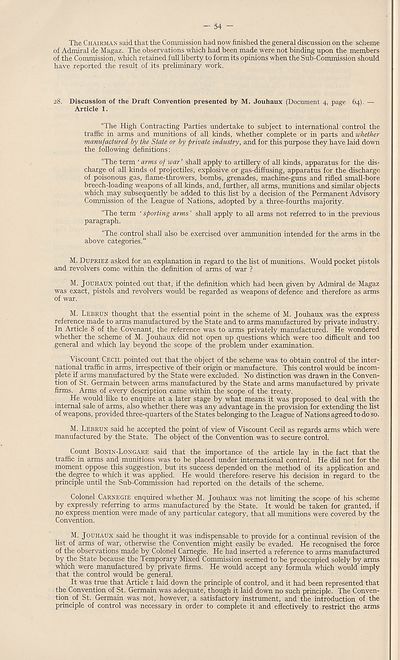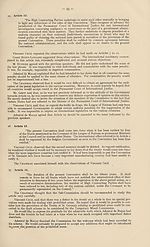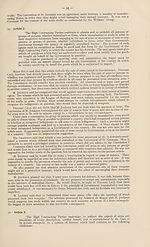Armament > Conference for the control of the international trade in arms, munitions and implements of war
(56)
Download files
Complete book:
Individual page:
Thumbnail gallery: Grid view | List view

— 54
The Chairman said that the Commission had now finished the general discussion on the scheme
of Admiral de Magaz. The observations which had been made were not binding upon the members
of the Commission, which retained full liberty to form its opinions when the Sub-Commission should
have reported the result of its preliminary work.
28. Discussion of the Draft Convention presented by M. Jouhaux (Document 4, page 64). —
Article 1.
“The High Contracting Parties undertake to subject to international control the
traffic in arms and munitions of all kinds, whether complete or in parts and whether
manufactured by the State or by private industry, and for this purpose they have laid down
the following definitions:
“The term ‘ arms of war ’ shall apply to artillery of all kinds, apparatus for the dis¬
charge of all kinds of projectiles, explosive or gas-diffusing, apparatus for the discharge
of poisonous gas, flame-throwers, bombs, grenades, machine-guns and rifled small-bore
breech-loading weapons of all kinds, and, further, all arms, munitions and similar objects
which may subsequently be added to this list by a decision of the Permanent Advisory
Commission of the League of Nations, adopted by a three-fourths majority.
“ The term ‘ sporting arms ’ shall apply to all arms not referred to in the previous
paragraph.
“The control shall also be exercised over ammunition intended for the arms in the
above categories.”
M. Dupriez asked for an explanation in regard to the list of munitions. Would pocket pistols
and revolvers come within the definition of arms of war ?
M. Jouhaux pointed out that, if the definition which had been given by Admiral de Magaz
was exact, pistols and revolvers would be regarded as weapons of defence and therefore as arms
of war.
M. Lebrun thought that the essential point in the scheme of M. Jouhaux was the express
reference made to arms manufactured by the State and to arms manufactured by private industry.
In Article 8 of the Covenant, the reference was to arms privately manufactured. He wondered
whether the scheme of M. Jouhaux did not open up questions which were too difficult and too
general and which lay beyond the scope of the problem under examination.
Viscount Cecil pointed out that the object of the scheme was to obtain control of the inter¬
national traffic in arms, irrespective of their origin or manufacture. This control would be incom¬
plete if arms manufactured by the State were excluded. No distinction was drawn in the Conven¬
tion of St. Germain between arms manufactured by the State and arms manufactured by private
firms. Arms of every description came within the scope of the treaty.
He would like to enquire at a later stage by what means it was proposed to deal with the
internal sale of arms, also whether there was any advantage in the provision for extending the list
of weapons, provided three-quarters of the States belonging to the League of Nations agreed to do so.
M. Lebrun said he accepted the point of view of Viscount Cecil as regards arms which were
manufactured by the State. The object of the Convention was to secure control.
Count Bonin-Longare said that the importance of the article lay in the fact that the
traffic in arms and munitions was to be placed under international control. He did not for the
moment oppose this suggestion, but its success depended on the method of its application and
the degree to which it was applied. He would therefore reserve his decision in regard to the
principle until the Sub-Commission had reported on the details of the scheme.
Colonel Carnegie enquired whether M. Jouhaux was not limiting the scope of his scheme
by expressly referring to arms manufactured by the State. It would be taken for granted, if
no express mention were made of any particular category, that all munitions were covered by the
Convention.
M. Jouhaux said he thought it was indispensable to provide for a continual revision of the
list of arms of war, otherwise the Convention might easily be evaded. He recognised the force
of the observations made by Colonel Carnegie. He had inserted a reference to arms manufactured
by the State because the Temporary Mixed Commission seemed to be preoccupied solely by arms
which were manufactured by private firms. He would accept any formula which would imply
that the control would be general.
It was true that Article 1 laid down the principle of control, and it had been represented that
the Convention of St. Germain was adequate, though it laid down no such principle. The Conven¬
tion of St. Germain was not, however, a satisfactory instrument, and the introduction of the
principle of control was necessary in order to complete it and effectively to restrict the arms
The Chairman said that the Commission had now finished the general discussion on the scheme
of Admiral de Magaz. The observations which had been made were not binding upon the members
of the Commission, which retained full liberty to form its opinions when the Sub-Commission should
have reported the result of its preliminary work.
28. Discussion of the Draft Convention presented by M. Jouhaux (Document 4, page 64). —
Article 1.
“The High Contracting Parties undertake to subject to international control the
traffic in arms and munitions of all kinds, whether complete or in parts and whether
manufactured by the State or by private industry, and for this purpose they have laid down
the following definitions:
“The term ‘ arms of war ’ shall apply to artillery of all kinds, apparatus for the dis¬
charge of all kinds of projectiles, explosive or gas-diffusing, apparatus for the discharge
of poisonous gas, flame-throwers, bombs, grenades, machine-guns and rifled small-bore
breech-loading weapons of all kinds, and, further, all arms, munitions and similar objects
which may subsequently be added to this list by a decision of the Permanent Advisory
Commission of the League of Nations, adopted by a three-fourths majority.
“ The term ‘ sporting arms ’ shall apply to all arms not referred to in the previous
paragraph.
“The control shall also be exercised over ammunition intended for the arms in the
above categories.”
M. Dupriez asked for an explanation in regard to the list of munitions. Would pocket pistols
and revolvers come within the definition of arms of war ?
M. Jouhaux pointed out that, if the definition which had been given by Admiral de Magaz
was exact, pistols and revolvers would be regarded as weapons of defence and therefore as arms
of war.
M. Lebrun thought that the essential point in the scheme of M. Jouhaux was the express
reference made to arms manufactured by the State and to arms manufactured by private industry.
In Article 8 of the Covenant, the reference was to arms privately manufactured. He wondered
whether the scheme of M. Jouhaux did not open up questions which were too difficult and too
general and which lay beyond the scope of the problem under examination.
Viscount Cecil pointed out that the object of the scheme was to obtain control of the inter¬
national traffic in arms, irrespective of their origin or manufacture. This control would be incom¬
plete if arms manufactured by the State were excluded. No distinction was drawn in the Conven¬
tion of St. Germain between arms manufactured by the State and arms manufactured by private
firms. Arms of every description came within the scope of the treaty.
He would like to enquire at a later stage by what means it was proposed to deal with the
internal sale of arms, also whether there was any advantage in the provision for extending the list
of weapons, provided three-quarters of the States belonging to the League of Nations agreed to do so.
M. Lebrun said he accepted the point of view of Viscount Cecil as regards arms which were
manufactured by the State. The object of the Convention was to secure control.
Count Bonin-Longare said that the importance of the article lay in the fact that the
traffic in arms and munitions was to be placed under international control. He did not for the
moment oppose this suggestion, but its success depended on the method of its application and
the degree to which it was applied. He would therefore reserve his decision in regard to the
principle until the Sub-Commission had reported on the details of the scheme.
Colonel Carnegie enquired whether M. Jouhaux was not limiting the scope of his scheme
by expressly referring to arms manufactured by the State. It would be taken for granted, if
no express mention were made of any particular category, that all munitions were covered by the
Convention.
M. Jouhaux said he thought it was indispensable to provide for a continual revision of the
list of arms of war, otherwise the Convention might easily be evaded. He recognised the force
of the observations made by Colonel Carnegie. He had inserted a reference to arms manufactured
by the State because the Temporary Mixed Commission seemed to be preoccupied solely by arms
which were manufactured by private firms. He would accept any formula which would imply
that the control would be general.
It was true that Article 1 laid down the principle of control, and it had been represented that
the Convention of St. Germain was adequate, though it laid down no such principle. The Conven¬
tion of St. Germain was not, however, a satisfactory instrument, and the introduction of the
principle of control was necessary in order to complete it and effectively to restrict the arms
Set display mode to:
![]() Universal Viewer |
Universal Viewer | ![]() Mirador |
Large image | Transcription
Mirador |
Large image | Transcription
Images and transcriptions on this page, including medium image downloads, may be used under the Creative Commons Attribution 4.0 International Licence unless otherwise stated. ![]()
| League of Nations > Armament > Conference for the control of the international trade in arms, munitions and implements of war > (56) |
|---|
| Permanent URL | https://digital.nls.uk/195382491 |
|---|
| Shelfmark | LN.IX |
|---|
| Description | Over 1,200 documents from the non-political organs of the League of Nations that dealt with health, disarmament, economic and financial matters for the duration of the League (1919-1945). Also online are statistical bulletins, essential facts, and an overview of the League by the first Secretary General, Sir Eric Drummond. These items are part of the Official Publications collection at the National Library of Scotland. |
|---|---|
| Additional NLS resources: |
|

